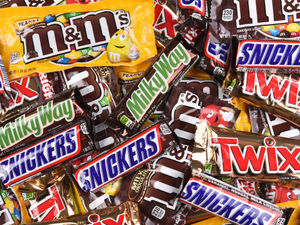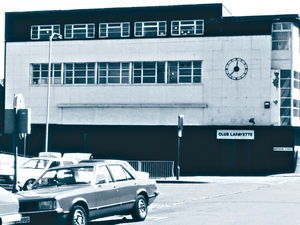Confectionery rebranding: Changes that leave a sour taste
Oh really. What the flip? Posh people’s food store and occasional purveyor of old people’s clothing Marks & Spencer has changed the name of one of its most popular sweets. Midget Gems will henceforth be known as Mini Gems.

Those living with dwarfism – or achondroplasia, to give it its proper name – may be offended by the term Midget Gems, which means they’re now mini.
And next week BMW, the makers of the MINI, will voice its objection and the sweets will be rebranded Tiny Gems.
At which point Tiny House UK, the Guildford-based manufacturer of small homes for gardens, will lodge its objection to M&S and the sweets will again be rebranded.
Graham Brady, the chair of the Conservative Party’s 1922 committee, will be asked to get involved. He’ll sit by his desk, receiving more letters than Santa, then come to a final conclusion. “The sweets will henceforth be known as Gems,” he will proclaim.
At which point, jewellers of the world will unite and beg Sir Graham to lobby M&S in order to rename them ‘Small Sweets’.
The matter will once and for all be settled and we can go on with worrying about whether Russia will invade the Ukraine or whether the damaged Tongan undersea cable will be repaired so that we can all find out what’s going on in the Pacific.
Or something.
Is nothing safe any more? The change of Midget Gems to Mini Gems to Tiny Gems to Gems to Small Sweets isn’t the only time our precious tuck shop favourites have been targeted.
Remember Percy Pigs? The sweets that draw people into M&S were threatened with a total ban not too long ago as the National Obesity Forum chair decided sweets should not resemble cartoon characters. Though I’m not sure which cartoon character is a pig. Most of them are cats or variations on superheroes – definitely not pigs.
The Forum was convinced that sweets associated with popular children’s characters should be associated with in-your-face good food. Though precisely what constitutes in-your-face-good food is anyone’s guess.
At Weekend Towers, it’s a bhuna with naan bread on a Friday night, though I suppose that’s unlikely to find its way into the aisles of M&S in Shrewsbury.
Midget Gems – sorry, Mini Gems – are not the first to go down this sorry route.
Confectionary historian Tim Richardson, no relation and not a nom-de-plume, says cavemen discovered our sweet tooth 8,000 years before the birth of the popular, fictional character, Jesus.
Bee hives were the equivalent of Spar as men too tough to worry about getting stung would raid hives in search of their sweet fix.
Lollipops were created around 1550AD, gums and pastilles followed in the 1650s and toffee became more popular than a Sue Gray inquiry in the 1890s.
Boiled sweets, chewing and bubble gum, sherbet, marshmallows and others followed while Liquorice Allsorts were invented by a salesman in the Midlands who was carrying around samples when they all got muddled up.
Eventually, we arrived at Midget Gems. Though not before we’d all grown to love the humble Marathon (remember that?) which was rebranded Snickers by multinational confectionery chain Mars.
The name change came about to fit in with the global brand – nope, we don’t understand why it really changed either – in 1990. Apparently, they were only called Marathons in the UK and Ireland so like the right-sized-apples in supermarkets, we had to get with the programme with other nations.
Not that Marathons were forgotten about.
In 2019, Marathons resurfaced for a limited time in their modern plastic wrapping as four million were sold in just 12 weeks. The campaign proved so popular that Mars again launched Marathon bars in 2020 for three months and sold a stack of them. Which kinda begs the question, why not just leave the name Marathon because it’s the one we all love?
Snickers are not the only ones. Opal Fruits were changed to Starburst in 1998, sparking a huge debate. I know, there was the Piper Alpha oil rig explosion, the bombing of the Pan Am Flight 103 and the merger of the SDP and Liberal parties to form the Liberal Democrats that year, but still the matter that exercised our brains most was the name change of Opal Fruits. Cheeky old Asda realised how we pined and brought back the original Opal Fruit name in 2008. Go Asda. Yeah.
Daim Bars and Dime Bars is another. Though, let’s face it, that’s not so bad. It says the same thing – just with a different spelling. The UK, however, held out in the face of pressure from Swedish manufacturers Marabou. While the name was changed to Daim in 1990 to standardise the bar around the world, we kept Dime on the shelves until 2005.
Ha. Stick that in your chocolate bar machine, Mr Marabou.
Around the world, there have been more. Twix and Raider. Milky Way and Flyte. Boost Peanut and Starbar. Milky Bar and Galak. Changing the name of popular sweets is the sort of marketing department wheeze beloved by those who don’t want to offend our sensibilities but do want to be able to print the same label for sweets worldwide.
And yet little do they realise the affection in which we hold our sweets. Changing a name is cutting the ties to happy childhood memories. It’s disrupting the topography of our inner lives, making us fit in with something that’s alien and unpopular and that wrests us away from contentment and peace.
So our plea to those in power is this. Please don’t change Flakes to Wave Bar, Maltesers to Choco Choco Balls, Cadbury Fingers to Chocolate Sticks or Wispa Bars to Tiny Bubbles. Just leave the damn things alone. The stress of having to grow to love a new brand is all too much. So we’re off to lie down in a dark room with a packet of Midget Gems.





